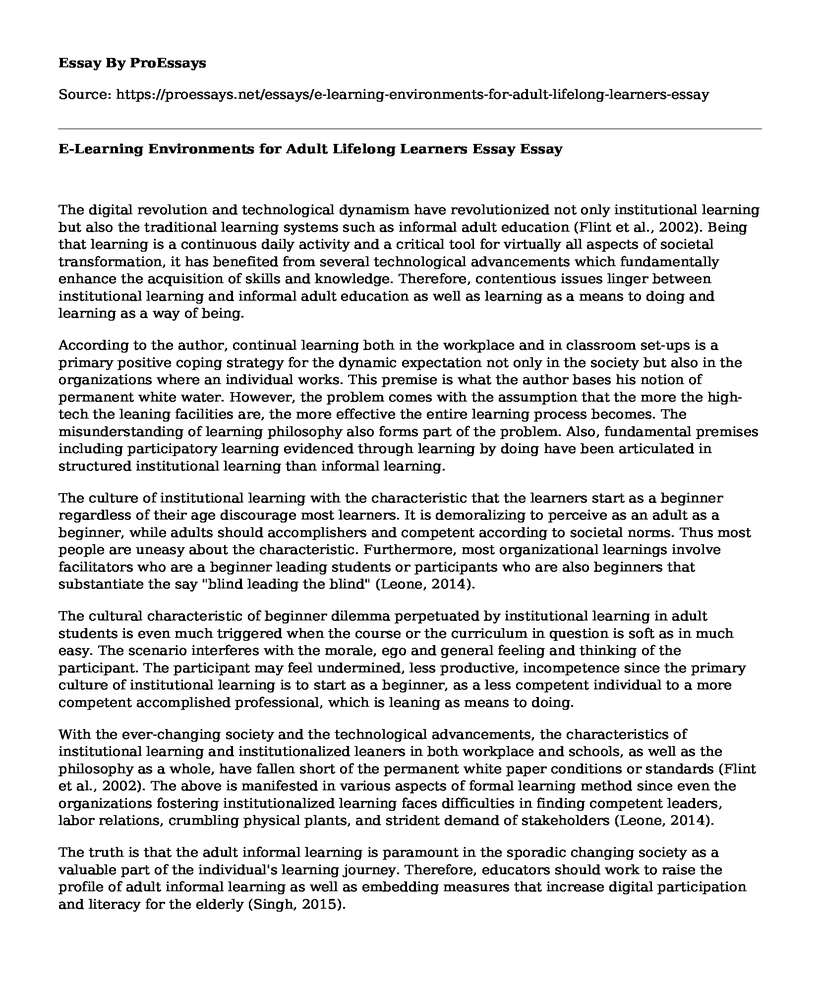The digital revolution and technological dynamism have revolutionized not only institutional learning but also the traditional learning systems such as informal adult education (Flint et al., 2002). Being that learning is a continuous daily activity and a critical tool for virtually all aspects of societal transformation, it has benefited from several technological advancements which fundamentally enhance the acquisition of skills and knowledge. Therefore, contentious issues linger between institutional learning and informal adult education as well as learning as a means to doing and learning as a way of being.
According to the author, continual learning both in the workplace and in classroom set-ups is a primary positive coping strategy for the dynamic expectation not only in the society but also in the organizations where an individual works. This premise is what the author bases his notion of permanent white water. However, the problem comes with the assumption that the more the high-tech the leaning facilities are, the more effective the entire learning process becomes. The misunderstanding of learning philosophy also forms part of the problem. Also, fundamental premises including participatory learning evidenced through learning by doing have been articulated in structured institutional learning than informal learning.
The culture of institutional learning with the characteristic that the learners start as a beginner regardless of their age discourage most learners. It is demoralizing to perceive as an adult as a beginner, while adults should accomplishers and competent according to societal norms. Thus most people are uneasy about the characteristic. Furthermore, most organizational learnings involve facilitators who are a beginner leading students or participants who are also beginners that substantiate the say "blind leading the blind" (Leone, 2014).
The cultural characteristic of beginner dilemma perpetuated by institutional learning in adult students is even much triggered when the course or the curriculum in question is soft as in much easy. The scenario interferes with the morale, ego and general feeling and thinking of the participant. The participant may feel undermined, less productive, incompetence since the primary culture of institutional learning is to start as a beginner, as a less competent individual to a more competent accomplished professional, which is leaning as means to doing.
With the ever-changing society and the technological advancements, the characteristics of institutional learning and institutionalized leaners in both workplace and schools, as well as the philosophy as a whole, have fallen short of the permanent white paper conditions or standards (Flint et al., 2002). The above is manifested in various aspects of formal learning method since even the organizations fostering institutionalized learning faces difficulties in finding competent leaders, labor relations, crumbling physical plants, and strident demand of stakeholders (Leone, 2014).
The truth is that the adult informal learning is paramount in the sporadic changing society as a valuable part of the individual's learning journey. Therefore, educators should work to raise the profile of adult informal learning as well as embedding measures that increase digital participation and literacy for the elderly (Singh, 2015).
Conclusion
In conclusion, learning as a way of being, emerging out as the best learning method for working and living, thinking and feeling is an effective method of learning for adults. Being, in this case, implies the whole person mostly articulated by informal learning. The methods marshal the entire being of an individual emotionally including the unconscious mind into the permanent white paper hence effective.
Reference list
Flint, T. A., & Council for Adult and Experiential Learning (U.S.). (2002). Best practices in adult learning: A self-evaluation workbook for colleges and universities. Dubuque, Iowa: Kendall/Hunt Pub.
Leone, S. (2014). Synergic integration of formal and informal e-learning environments for adult lifelong learners. Hershey PA Information Science Reference, an imprint of IGI Global
Singh, M. (2015). Global perspectives on recognizing non-formal and informal learning: Why recognition matters. Cham: Springer Open, 2015
Cite this page
E-Learning Environments for Adult Lifelong Learners Essay. (2022, Jul 20). Retrieved from https://proessays.net/essays/e-learning-environments-for-adult-lifelong-learners-essay
If you are the original author of this essay and no longer wish to have it published on the ProEssays website, please click below to request its removal:
- Essay Sample on Challenges of Fitting Neural Nets
- Student Development and Career Decision-Making Paper Example
- Statement of Research Interests
- Essay Sample on Criteria for Selecting Early Childhood Development Center
- Masters in Management Studies at Duke University - Essay Sample
- Paper Example on Introducing New Hotshot Trucking.Com: All Your Trucking Needs In One Place
- Essay Example on Children and Mobile Phones: Impact of Globalization & Technology







